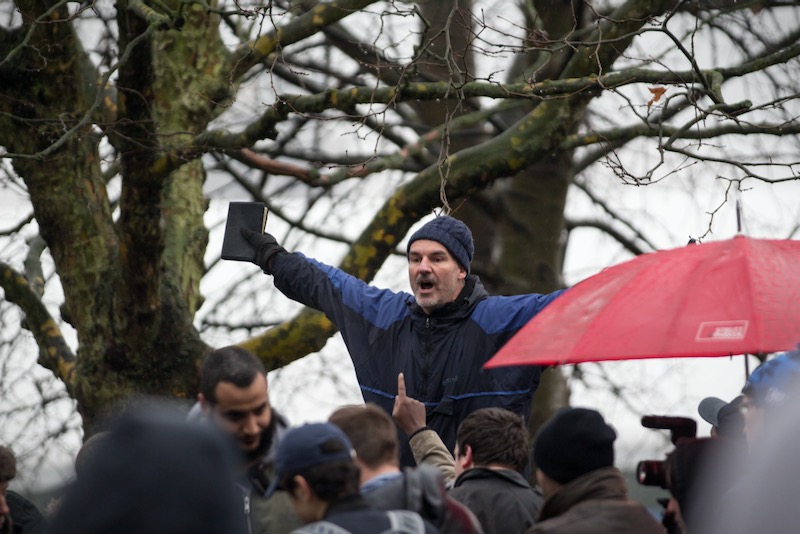There is much discussion about attacks on free speech at the moment. Universities and professions, which are free and independent institutions but which contribute to wider culture, have taken actions which restrict free speech by cancelling fellowships, cancelling speaking engagements or making it difficult to express a faith while practising a profession. Public Space Protection Orders and Community Protection Notices are used to stop people protesting, talking to other people and even praying in widely defined areas. And then there is the concept of the “hate incident” of which the journalist Darren Grimes fell foul last week.
The concept of a “hate incident”, as distinct from a “hate crime” might be something that should worry Christians in fact. Let’s consider two cases.
In the first, a Baptist Church in Norfolk displayed a poster suggesting that, if you did not believe in God, you would go to hell. The bottom of the poster depicted flames. Rather amusingly, the poster happened to be adjacent to another poster offering visitors a warm welcome in the church. The destination of hell for non-believers is standard Christian teaching for some (though not for all) Christian denominations. Nevertheless, a 20-year-old complained to the police stating that he believed that Christianity is inclusive and loving in nature. The police registered the poster as a “hate incident”. The police stated: “National guidance required us to investigate the circumstances and the matter has been recorded as a hate incident. Having spoken to the pastor of the church, it has been agreed the poster will be taken down.” There seems to be no doubt that the police believed that they were required to register the poster as a hate incident, that they visited the pastor and that the visit caused the poster to be removed. Norfolk police say that, in total, there are 1,200 such recorded hate incidents each year.
In the second case, Oluwole Ilesanmi was arrested and questioned by the Metropolitan Police for alleged hate speech crimes whilst he was street preaching from the Gospel. He was then released and awarded £2,500 compensation for wrongful arrest and humiliating and distressing treatment at the hands of the police.
There is a direct effect on free speech of police involvement in these cases. In the case of the Norfolk Baptist church, the poster was taken down. In the case of Oluwole Ilesanmi, he was removed from the street whilst speaking. But there must be an even greater indirect effect. Few people wish to go through a police investigation and may be put off from speaking freely because they are worried about the consequences. Or, if an individual has been reported for a hate incident on one occasion, especially if they have family, including children at school, they may give up campaigning for whatever cause led to the apparent offence.
This intervention by the police in these situations (remember, 1,200 such reported incidents in Norfolk) can undermine free speech in a major way. Surely, the law should not prevent any individual or religious group talking publicly about “eternal damnation” except in very limited circumstances such as when somebody is deliberately mental intimidating another individual. It should be possible to have debates about transgender issues and gay marriage without somebody receiving a visit from the police for expressing a perfectly reasonable point of view. There will always be cases, of course, where the police interview or even arrest people in circumstances that turn out to be inappropriate. However, in this case, the law encourages such action.
A hate crime is defined by the Crown Prosecution Service (CPS) in the following way:
The term 'hate crime' can be used to describe a range of criminal behaviour where the perpetrator is motivated by hostility or demonstrates hostility towards the victim's disability, race, religion, sexual orientation or transgender identity…A hate crime can include verbal abuse, intimidation, threats, harassment, assault and bullying, as well as damage to property.
This is, in fact, a high and reasonable hurdle for prosecution and should not be the focus of our objections.
The problem is that incidents are recorded as hate incidents by the police, and have to be investigated as such, if, in the opinion of the alleged victim or any other person (Norfolk police are campaigning to encourage third-party reporting), an incident was motivated by hatred or prejudice based on one of the stated characteristics in the Equality Act. There does not have to be any evidence of a “hate” element or, for that matter, any evidence of a crime. This is worth repeating: the police, whose job is to uphold the criminal law, are required to investigate “hate incidents” where there is no evidence of either hate or crime. This can lead to controversial but reasonable opinions being the basis of a visit from the police or even arrest even if there is no chance of prosecution. The publicity generated can ruin people’s careers.
It is easy to see how the threat of the reporting of a hate incident may stifle free speech and debate. Indeed, in both cases cited above, such action led to the cessation of the activity. Many people will simply not wish to encounter the police in the course of their daily lives and they should not feel inhibited from speaking freely for fear that they might do so. It should also not be possible for an individual to shut down legitimate debate simply by reporting a hate incident to the police.
None of the above argument condones unlawful conduct. Nor does it condone any form of vile activity which might be disgusting but not criminal. However, the police seem to be a law unto themselves – or at least they are asked to operate to a standard which is, in fact, different from the law which they are supposed to be enforcing. It is difficult to see how we can get out of this situation. But I would suggest, at least, a thorough review of the law, procedures and police training so that individuals do not feel harassed simply going about their normal lawful business – even where that lawful business ruffles a few feathers. Free speech is a value that is protected in most written constitutions. The law itself seems to protect free speech adequately. But the processes surrounding its enforcement do not.



 Loading ...
Loading ...
What do you think?
You can post as a subscriber user ...
User comments (0)